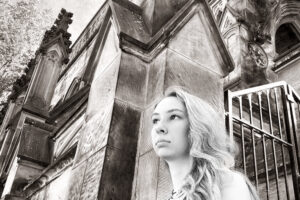Portraiture is one of those photographic niches that sometimes gets overlooked. Not that it isn’t a popular niche in its own right, but compared to the number of photographs that are centered around landscapes, cityscapes, interesting objects — places and things, in other words — there just doesn’t seem to be as many portraits. Not those created for the sake of art, anyway. I’m sure there are probably plenty of professional portraits for families, business people and so on.
It’s kind of a shame because when you really think about it, portraiture has huge potential for art. Even among those photographs created for families and professionals. But so often, these types of portraits are a static thing. They remind me of still life images, in away. The person featured has a smile or a mostly neutral expression. There’s often not much unique to set one smiling face apart from the next, nothing that really defines them as an unusual piece of art.
In wedding photography and similar types of photography, we are seeing trends that feature much more dynamism these days. But the more static trend is particularly prominent in images like headshots, which are very often more on the bland side. And that does make some sense. There’s nothing wrong with static portraits. In some cases, like with professional profile images, a more neutral image is the desired style because it’s not so much about art as it is about presenting oneself effectively.
But where art is concerned, the static pose or the neutral smile — it’s not enough. There must be something about a portrait that sets it apart from its more neutral counterparts. So how does a photographer go about doing this?
The biggest thing you can do is get to know your subject. They’re not just a subject. This person is someone with feelings, interests, likes, and dislikes. Speak to them, get to know them. Ask questions and learn a little something about them. Take an interest, and when you find common ground of some sort, engage with the person. It doesn’t necessarily need to be about happy topics. Maybe you’re trying to create something that features a little sorrow, or that inspires anger.
The key is to learn enough that you can spark emotion within the person. When that emotion shines through, that’s when you take the photograph. The art within a portrait comes through in the expressions. Even if a person doesn’t have a huge smile or a face obviously contorted with some strong emotion, there are the micro-expressions to consider. These are most often almost imperceptible changes around the eyes, nose and the mouth, just small hints of emotion, subtle but immediately recognizable to anyone who sees them. That’s what brings a portrait to life. Get your subject animated, and you’ll be amazed by the life that animation breathes into your portraiture.





